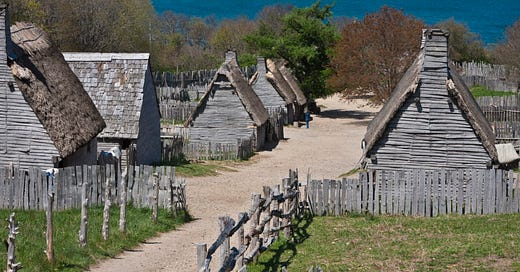The Blackamore in Plimoth Settlement
The Never Ending Debate about Abraham Pearse's Complexion and Origins
Abraham Pearse arrived in the Plymouth colony in 1623 aboard the Anne, the servant of another Mr. Perce. He may have been a man of dark complexion and African heritage, although that has been vigorously debated for nearly 200 years.
In 1627, when the colony's communal farm was broken up into private landholdings, Pearse was among those who received cattle in the division of the settlement's herd. By 1633 he was a freeholder and a taxpayer, served on a coroner's jury in 1636, was listed as a householder in 1637, and was granted forty acres of upland and meadow at North River in 1640, the area that later became Duxbury.
Robert Marten, director of programs at the Plimoth Plantation historical center for eighteen years, was fired in 1981, after hiring a young African American drama student from Brockton named Croney Southern to play the role of Pearse in the center's reenactment of Pilgrim life. This actor was often asked by visitors "Are you a slave?" No, he replied, I'm a freeholder. This is my home, this is my land.
Marten hadn't really discovered anything new. Senator Charles Sumner gave a speech on the senate floor in 1860 pointing to a 1643 list of persons “Able to Bear Arms” on which Pearse is listed, followed by a line reading "the blackamore." Nathaniel B. Shurtleff, M.D. published a copy between 1855 and 1861, based on a copy made from one taken by the commissioners appointed by the General Court of Massachusetts in 1813. The 1643 roster was also cited by John Gorham Palfrey and Francis Winthrop Palfrey in 1899 (History of New England 2, p. 30), “from which we infer, both that Negroes were not dispensed from military service in that Colony, and that their number was extremely small.” Why was Marten fired for hiring a man of dark complexion to play the role of Pearse?
Keep reading with a 7-day free trial
Subscribe to Citizen Historian to keep reading this post and get 7 days of free access to the full post archives.




